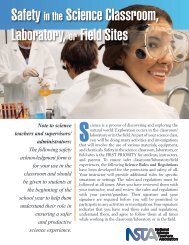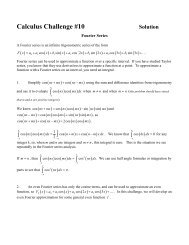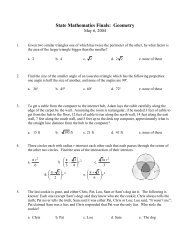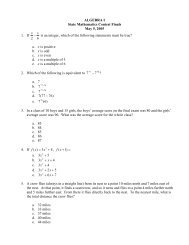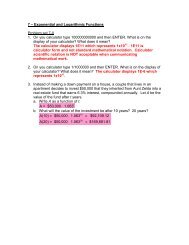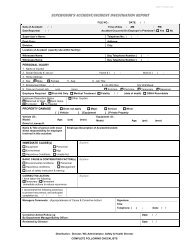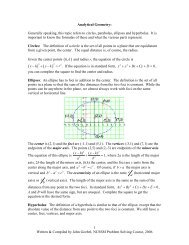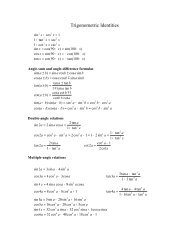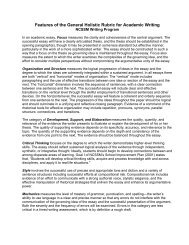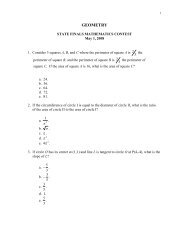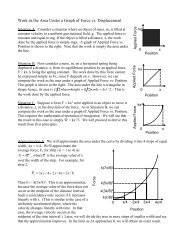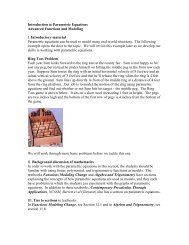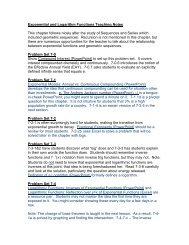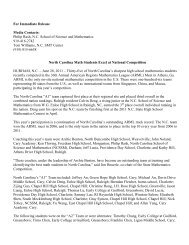NCSSM COURSE CAtAlOG - North Carolina School of Science and ...
NCSSM COURSE CAtAlOG - North Carolina School of Science and ...
NCSSM COURSE CAtAlOG - North Carolina School of Science and ...
Create successful ePaper yourself
Turn your PDF publications into a flip-book with our unique Google optimized e-Paper software.
about family <strong>and</strong> gender roles, cultural values, religion, education, work,<br />
economics, politics, <strong>and</strong> environmental issues, as well as myriad other subjects<br />
that will help us gain a deeper underst<strong>and</strong>ing <strong>of</strong> our global community. Realtime<br />
small group videoconferencing <strong>and</strong> partnered individual text chat are part<br />
<strong>of</strong> every class. Students help to develop the key themes <strong>and</strong> modes <strong>of</strong> inquiry for<br />
this course. Drawing on research that they conduct during this course, material<br />
they have explored in their American Studies classes, as well as their own<br />
observations <strong>and</strong> experiences as American students, students share with their<br />
international peers aspects <strong>of</strong> American culture, history, society, economics,<br />
<strong>and</strong> politics <strong>and</strong>, in turn, are taught by their international student partners about<br />
their own countries <strong>and</strong> cultures. Students keep a journal <strong>and</strong> complete a<br />
number <strong>of</strong> written assignments asking them to reflect on <strong>and</strong> to think critically<br />
about the information <strong>and</strong> experiences they glean from their cross-cultural<br />
discussions. The course culminates in projects that students create in<br />
collaboration with their international partners. Students not only deepen their<br />
underst<strong>and</strong>ing <strong>of</strong> their own <strong>and</strong> others’ cultures but also become more aware <strong>of</strong><br />
how increasingly interconnected the world has become, <strong>and</strong> the important<br />
roles they play as responsible <strong>and</strong> caring global citizens.<br />
IE364 Completion <strong>of</strong> the Research Experience<br />
One trimester<br />
Credit: One unit core elective credit.<br />
Prerequisite: First-trimester or second-trimester senior <strong>and</strong> completion <strong>of</strong> IE354<br />
Introduction to the Research Experience.<br />
Meeting pattern: Three periods per week including lab.<br />
In this course senior students who have completed IE354 Introduction to the<br />
Research Experience implement the research project in computer science or<br />
the humanities that they proposed the previous year. Participants collect <strong>and</strong><br />
appropriately analyze data, then write a final paper describing their research.<br />
Students also make a formal oral <strong>and</strong> visual presentation <strong>of</strong> their findings.<br />
IE370 Research Experience in Biology<br />
One trimester<br />
Credit: One unit core elective credit.<br />
Meeting pattern: Four periods per week including lab.<br />
This introductory course is for students, with little previous experience, who want<br />
to pursue a research opportunity in science. During the first part <strong>of</strong> the course<br />
students learn to design <strong>and</strong> conduct an experiment, analyze data, <strong>and</strong> present<br />
their findings in a written paper. In addition, students read <strong>and</strong> discuss science<br />
articles. The second portion <strong>of</strong> the course is devoted to working in small groups<br />
on a research project. Research questions may be selected from areas<br />
identified by the instructor related to microbiology, DNA research, enzyme<br />
94



